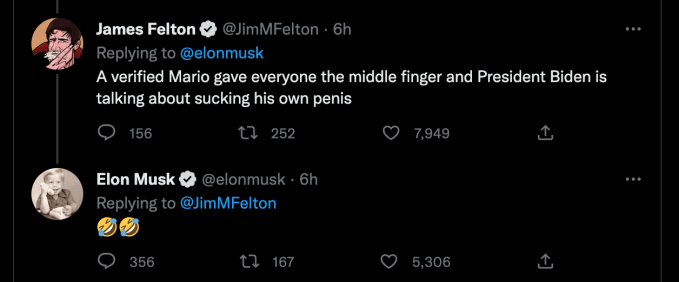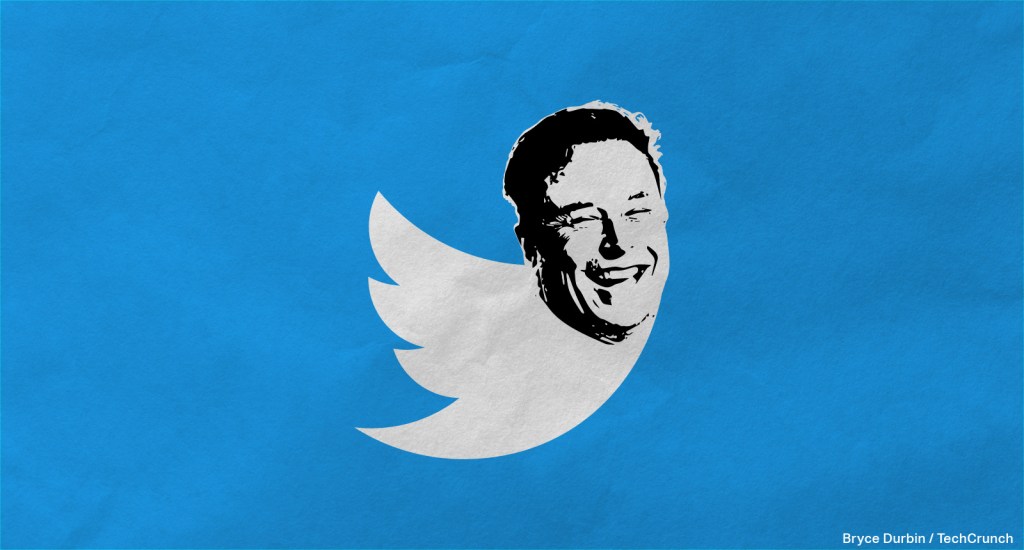Twitter’s painstakingly layered infosphere looks to be light-speeding back to chaotic noise under new owner Elon Musk. The billionaire is no fan of meritocratic signals nor, it seems, a friend to genuine information — preferring anyone pay him $8/m to have their account on his microblogging social network badged with a check-mark that looks like the old Twitter verification check yet does not involve Musk’s Twitter checking they are who they say they are.
In short, it’s a joke made real.
Now, in order to verify if a check mark displayed on a Twitter account is a legacy verification of actual identity — or just a late stage capitalism status symbol for Musk’s most loyal fanboys — users must click on the check symbol next to an account name and read the small print that pops up and will either read: “This account is verified because it’s notable in government, news, entertainment, or another designated category” (aka, it’s pre-Musk Twitter verified); or “This account is verified because it’s subscribed to Twitter Blue” (aka, not verified; but yes probably a Musk super fan).
At the time of writing, there is no ‘at a glance’ way to distinguish between the old ‘identify verified’ Twitter check mark and non-verified paying subscribers. It’s inherently confusing — presumably intentionally so, given Musk’s love of trolling.
He certainly wasted no time laughing about the informational chaos he’d wrought… (At least, we *think* the below account posting crying-with-laughter emojis is him but who can tell anything on Twitter these days?)

Musk’s new Twitter Blue subscription product enables imposters and other purveyors of misinformation to assume (and, if they wish, trash) reputations of others, one check-marked tweet at a time — as immediately started happening on launch — just so long as they can sign up for an $8 charge to pay for Musk’s “leveller” tool.
Early targets for impersonation by Twitter Blue subscribers have included basketball star LeBron James, former president George W Bush, former U.K. prime minister Tony Blair, and tech and gaming brands Apple, Nintendo and Valve Software among others. Account bans followed for some of these impersonator accounts soon after — but the barrier to entry to Musk’s chaos game is incredibly low so plenty more trolls will surely follow. (Hence Twitter’s new nickname being ‘$8chan’.)
Twitter Blue is also touted to boost the visibility of subscribers’ tweets vs non-subscribers thereby skewing the information surfaced by the platform’s algorithms — and most likely eroding the visibility of quality information (based on who’s happy to pay vs who’s not).
https://twitter.com/riptari/status/1590614132256313345
As we’ve reported before, the risks aren’t just reputational (nor to information quality on Twitter): Scams and fraud could easily result if genuine Twitter users are taken in by a fake that’s seeking to harvest their personal information for identity theft or pointing them towards malicious websites to try to run phishing scams to compromise financial information or other sensitive data.
Still, as Twitter users everywhere feel the chill of Twitter Blue diluting the veracity of verification signals available on the platform (is it an actual politician or a troll? Maybe that is Musk’s joke?), spare a thought for the European Union — whose reputation as a global regulator risks taking a major nose dive in the Musk-Twitter era.
Thing is, Twitter is an existing signatory to the EU’s recently beefed up Code of Practice on Disinformation — a voluntary set of “commitments and measures” platforms agree to apply with the goal of combating the spread of misinformation and disinformation online.
Seriously. Musk-owned Twitter is technically already signed up to actively fight disinformation.
Yes, we lol’d too.
If you take a look at the specifics of what Twitter’s prior leadership team signed the business up for it makes especially awkward reading for Musk-Twitter (and/or the European Commission) — with a requirement on the platform to “limit impermissible manipulative behaviours and practices” by having in place (and/or further bolstering) policies against “impersonation” (emphasis ours); and against “the creation and use of fake accounts“, to name just two especially relevant “behaviors and practices” Twitter is supposed to be discouraging rather than amplifying per this EU Code.
Twitter is also signed up to Commitment 18 of the Code — which is summarized in its subscription document as (again, with our emphasis):
“Relevant Signatories commit to minimise the risks of viral propagation of misinformation or disinformation by adopting safe design practices as they develop their systems, policies, and features.”
Hands up anyone who thinks Musk’s chaotic product iteration at Twitter since taking over as “Chief Twit” fits the bill for “safe design practices”?
Er… anyone? No, of course not.
It took Musk a matter of hours to kill an “official” extra layer of verification — which took the confusing form of a duplicate check mark and ‘official’ label (yes, srsly) — and had been (very) briefly applied to a sub-set of (legacy) verified accounts by certain of the remaining Twitter staff after Musk fired the other half of the company in a massive cost cutting drive immediately on taking over.
“I just killed it,” Musk tweeted yesterday in response to (legacy verified) YouTuber Marques Brownlee — who had just spotted that the ‘Official’ badge he’d also just spotted was now missing; aka, AWOL soon after materializing. So, basically: Ohhai chaos!
“Blue check will be the great leveler,” was all Musk offered by way of public explanation at the time.
Blue check will be the great leveler
— Elon Musk (@elonmusk) November 9, 2022
Trust & safety features that come and go within a matter of days/hours/minutes — and product launches that drastically impact trust & safety being rushed out without zero care and attention to their impact on, um, trust & safety — is the new normal at Musk-Twitter.
The Chief Twit said as much — tweeting soon after nixing the extra ‘Official’ label: “Please note that Twitter will do lots of dumb things in coming months. We will keep what works & change what doesn’t.”
Which is really another way of Musk taking a pen to the Disinformation Code and doing this:
“Relevant Signatories commit to minimise the risks of viral propagation of misinformation or disinformation by adopting safe design practices as they develop their systems, policies, and features.”
Please note that Twitter will do lots of dumb things in coming months.
We will keep what works & change what doesn’t.
— Elon Musk (@elonmusk) November 9, 2022
Oh and it keeps getting worse: Twitter’s CISO just abandoned ship too. Next up: FTC intervention?
Pre-Musk Twitter had problems too, of course. Most notably, it was fined $150 million by the FTC earlier this year for misrepresenting the security and privacy of user data over several years, for example. (And one can only imagine the scale of regulatory penalties that could rain down on Musk-Twitter if it fails to live up to its existing consent decree commitments to the FTC.)
What blowback is Musk going to face in the EU for thumbing his nose at regional lawmakers’ carefully constructed Code of Practice on Disinformation? In the short term probably not a lot — although some EU lawmakers are calling for Musk to testify in front of the European Parliament, as Bloomberg reported earlier. MEP Sophie in ‘t Veld told the news outlet she’s worried the platform will become a threat to democracy under Musk.
However it’s the European Commission that’s responsible for the Code of Practice on Disinformation — and for monitoring how it’s being applied.
We reached out to the Commission to ask if it has any concerns about Musk’s intentional levelling of Twitter’s verification system. A spokesman responded by telling us it is in contact with Twitter “in the context of the Code of Practice”.
“As Commissioner Breton recalled again recently we expect Twitter to respect all EU rules, this also includes the Code of Practice,” they added.
Last month, the EU’s internal market commissioner, Thierry Breton, wasted not time in schooling Musk on his taking ownership of Twitter that the bird must ‘fly by the EU’s rules’. But at press time we’d received no direct response from his office on the question of whether he has any concerns about account impersonations on Twitter spreading disinformation in the wake of Musk torching the value of verification.
The next batch of reports from Disinformation Code signatories aren’t due til January — so the EU’s executive may be trying to keep its head down to watch what unfolds in the coming, uhhhh, hours and minutes of Musk’s chaotic reign.
The Commission spokesperson did also imply that it’s watching to see if Musk launches Twitter Blue in the Single Market (the product has not yet been made available in the EU — in Europe it’s only available to U.K. users so far) — so, again, it could be keeping its powder dry to see if he adapts the feature-set for an EU launch to make it less, er, disinformation friendly. (That said, EU users are already being exposed to confusingly labelled tweets from Twitter Blue subscribers located outside the bloc so limiting scrutiny to local product launches would entirely miss the big picture confusion and risk letting Musk off the hook.)
It should be noted that the EU Code of Practice on Disinformation, while recently toughened up, remains a voluntary framework — so Musk violating commitments and measures that Twitter’s prior leadership signed up to can’t attract legal sanction at present.
It’s just a piece of paper — and the ink on the dotted line wasn’t even his to spill. So Musk doubtless does not feel beholden, if he’s even noticed this tiny detail. (Yes we also reached out to Twitter for comment but received no response.)
That said, the situation is set to change next year as the EU’s new flagship digital regulatory framework, the Digital Services Act (DSA), starts to come into application for larger platforms.
This is relevant because the Commission has intentionally linked following the Disinformation Code to compliance with the DSA — and the latter is legally binding across the EU (and can carry fines of up to 6% of global annual turnover for violations). So larger platforms that flout the bloc’s Code on Disinformation are risking the Commission finding them in breach of the DSA. Which will be a lot harder to ignore — at least for normal companies and CEOs.
Whether the EU will designate Twitter a VLOP (aka very large online platform) under the DSA is the big, burning question for regional Internet users at this point. And, really, for anyone concerned about Twitter’s slide into chaos under Musk — because the regulation looks to be one of the few meaningful checks (ha!) on Musk-Twitter in core areas of democratic risk like disinformation.
The real $44BN question, then, is who will pay the biggest price for Musk’s decision to devalue veracity on Twitter? The billionaire lord — assuming he gets slapped with hefty (enough) fines for intentionally wreaking havoc on trust & safety — or everyone else; the ‘peasants’ in this analogy, who can do nothing but wait to find out; aka, all the Internet users and people whose societies and democracies are being targeted for levelling down by disinformation purveyors (whether they’ve paid $8 to tweet or $44 billion to own Twitter).
For now, clearly, Musk’s chaos reigns.
Europe schools Elon Musk that Twitter’s wings are already clipped
Will Elon Musk put Twitter on a collision course with global speech regulators?































Comment